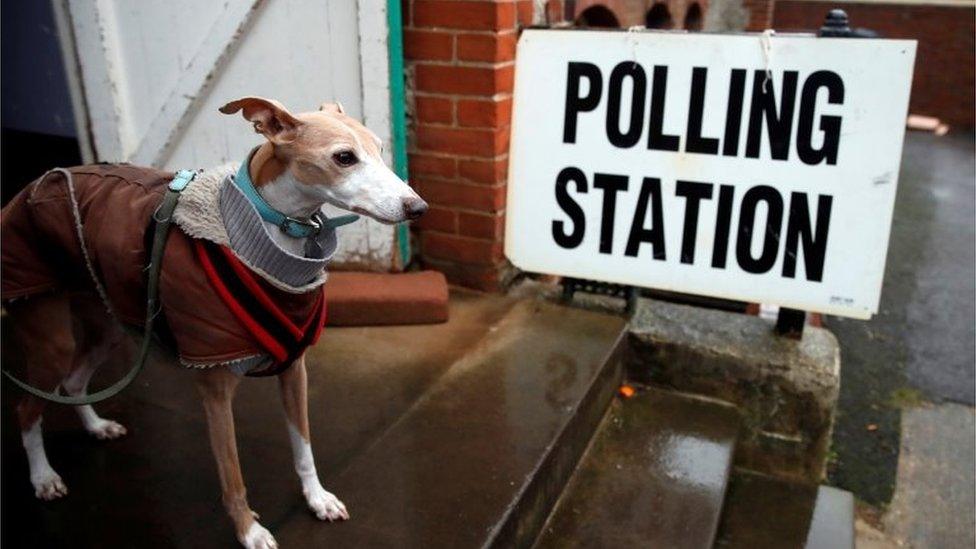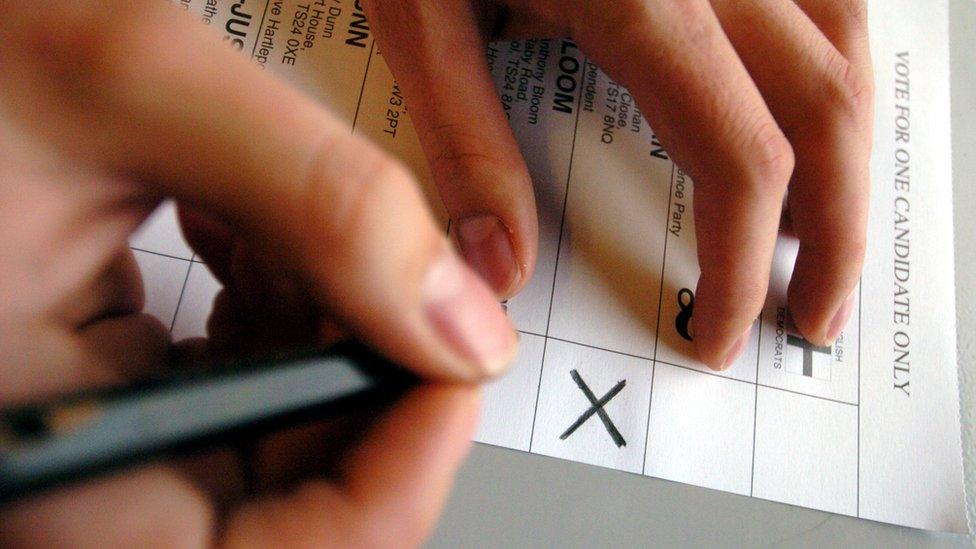Covid: Local elections to go ahead in England
- Published
- comments

May's local and mayoral elections in England are going ahead - but voters will be asked to bring their own pens to help combat coronavirus.
The government is giving councils an extra £31m for plastic screens in polling stations and hand sanitiser in an effort to make the polls Covid-safe.
And people who are shielding will be encouraged to vote by post.
But an all-postal ballot has been ruled out, despite local fears the elections will be too difficult to organise.
The Cabinet Office has said the government plans to vaccinate all of the first nine priority groups - including the over 50s - by May, external, giving it confidence to press ahead with the elections.
Police and crime commissioner (PCC) elections will also go ahead on 6 May in both England and Wales. Welsh local council elections are scheduled to take place next year.
Scottish Parliament and Welsh Senedd elections are also scheduled to take place this May - with the devolved governments responsible for running them.
The government had previously said the local elections for England, scheduled for 6 May, were under review amid uncertainty about lockdown restrictions.
But Cabinet Office minister Chloe Smith confirmed on Friday they will go ahead, arguing "democracy should not be cancelled because of Covid".
May will see a bumper crop of voting, with local elections that were postponed last year combined with those originally scheduled to take place in 2021.
It means around 5,000 council seats will be contested in 149 local authorities in England, alongside 25 seats in the London Assembly, and some mayoral races.
Lifts to the polls
Participation in local elections varies between years depending on which seats are up for grabs - around 7.5 million took part in England's elections in 2018, and 6.5 million in 2017.
As well as being asked to bring their own pen or pencil to mark their ballots, those voting in a polling station this year will have to wear a mask.
Candidates are also being asked not to give voters a lift to polling stations in their cars - a common practice at election time.

Polling booths must also be designed to ensure "maximum ventilation", the government says.
Rules on proxy voting - where people designate someone else to vote on their behalf - will also be changed to allow people who need to self-isolate to request an emergency proxy vote up until 5pm on polling day.
However, the government said it had decided against postal ballot-only elections "as this could increase fraud risk and reduce choice for voters".
Cost concerns
An extra £15m will be given to English councils to hold their elections, with an estimated additional £16m for PCC elections in England and Wales.
In a break with tradition, councils are also being asked not to use schools as polling stations in a bid to minimise any further disruption to pupils' education.

There's been growing expectation that the government would stick to May for these elections after ministers signalled they were reluctant to move them.
The government's action plan, the extension to proxy voting, and the extra funding have all been welcomed - but they haven't allayed all concerns.
Logistically, there are still questions over whether enough suitable polling stations can be found, whether PPE should be supplied to staff who man them, and whether all the extra costs incurred by councils will be covered.
Politically, the big worry is the impact on campaigning.
With door-to-door visits limited, there's concern about how to engage voters, and what the effect of a shift to online campaigns might mean.
Councils are saying they'll crack on now and make these elections happen safely, but that's not without its challenges.

Councillor John Fuller, Conservative leader of South Norfolk Council and chairman of the District Councils Network, said delaying the elections would have been the best option.
"It would have been better to have a poll conducted when everyone was vaccinated rather than a campaign started in lockdown, but we'll all pull together to make this work," he said.
He added that going ahead with elections in May would be "challenging," but said he was "relieved" that the need for extra costs had been recognised by the government.
Labour accused the government of being "woefully unprepared," warning "cash-strapped" local councils were not being given necessary support.
The party's shadow minister for democracy, Cat Smith, called for dedicated funding to help local authorities sign people up to vote by post.
"Ministers are yet to respond to the challenge of recruiting polling and count staff, with so many workers needed as Covid marshals and for additional cleaning," she added.
Fairness concerns
The Liberal Democrats have complained about government guidance, external that it is not "permissible" for party activists to knock on doors or post leaflets during lockdown.
A spokesman for the party accused ministers of trying to ban volunteer campaigning ahead of the polls, and called on them to "urgently retract" it.
"It cannot be right that it is legal for pizza delivery leaflets to come through your letterbox, but leaflets that criticise the government are not," they added.
"If putting your case to neighbours is banned, the election isn't fair."
Ministers say they will publish specific guidance on face-to-face campaigning after consulting political parties.
